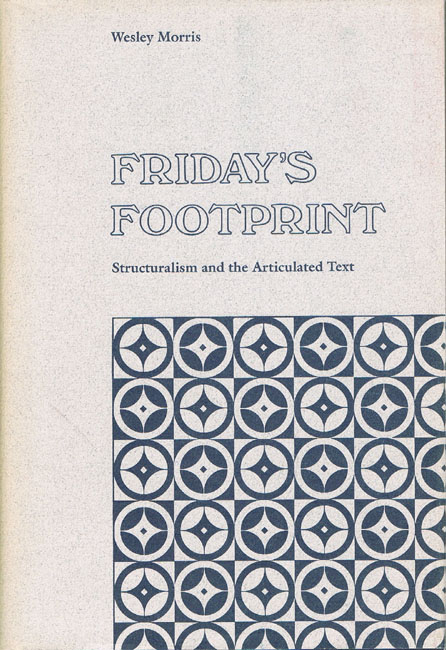Friday’s FootprintStructuralism and the Articulated TextWesley Morris |
 1979 Literary Criticism / European / General Philosophy / Movements / Deconstruction Philosophy / Movements / Structuralism 253 pp. 6x9 |
|||
|
read the full text of the book •
|
Wesley Morris has devoted himself to no less ambitious a task than to attempt a synthesis of a large number of theoretical critical perspectives usually treated as mutually exclusive. It is the measure of his achievement that he has been able to bring theoretical unity to the work of a rich variety of recent critics and to reconcile structuralism and poststructuralism with the divergent systems of such writers as Cassirer and Wittgenstein, the existentialist Sartre, phenomenologists like Merleau–Ponty and Pulet, and the linguists Chomsky and Jakobson—critics whose schools are throught to be antagonistic, not only to the structuralist and poststructuralist phenomena, but to one another as well. The design of Friday’s Footprint serves to guide the reader toward a theory of literary interpretation, the primary issue of which is to define the literary “text” and its “context.” Professor Morris begins with a discussion of William Faulkner’s Go Down, Moses as an example of this author’s “uses” of myth in forging his novel – “uses” being a term that, he points out, must be read as ambiguous, since it is not clear to what degree Faulkner uses the “Myth of the South” and to what extent (as Claude Lévi Strauss would insist) the myth uses him. It is clear from this discussion, however, that because the novel “belongs to” culture, it also reflects the problematics of all human being and belonging; and insofar as the novel is an articulate text, the problematics of belonging poses questions of meaning, style, and self–expression that must be examined in light of both traditional romantic philosophies of language and the challenges to that tradition raised by contemporary structuralist and poststructuralist theory. The discussion of the philosophy of language and stylistics in succeeding sections represents an attempt to deal with these problems in a series of dialectical engagements with major philosophers and critics. In Plato, Wittgenstein, and Cassirer, we encounter the clash between system and individual utterance; in Chomsky and Piaget, we acquire definitions of the notions of structuration and developmentalist historicism; in Lacan, Derrida, and Althusser, we observe the complexity of cultural/invididual interplay, of the psychological interpenetration of outer and inner worlds. Style emerges as the repository of this problematic nature of the language; and an investigation of the theory of stylistic analysis posited from Leo Spitzer to Roman Jakobson, Roland Barthes, Jonathan Culler, Michel Riffaterre, and Richard Ohmann, among many others, discloses that the traditional distinctions made among ideas of style seem distorting. For style encompasses functions found distinctive as an “act of articulation.” In the concluding section, it becomes clear that, though literary interpretation embodies no neat unified methodology, it must proceed from a complex and unified set of assumptions about language, thought, and cultural/historical identity. Interpretation is made necessary by a rupture in the fabric of the cultural/mythical context caused by the “articulate” voice of the author. On the one hand, the text’s essential weakness as object, its inadequacy to the linguistic and cultural context from which it derives, demands interpretation as an endless act of completion. On the other hand, the text’s daring thrust toward dixcrete experience calls attention to the fleeting yet fundamentally human moment of meaningful communication. Thus the privileged ideality of the literary text is not its objective or “ontic” status, but rather its showing forth of the full range of the capacities of language and man to produce meaning. Wesley Morris is associate professor of English at Rice University and the author of Toward a New Historicism (Princeton University Press, 1972). | |||

